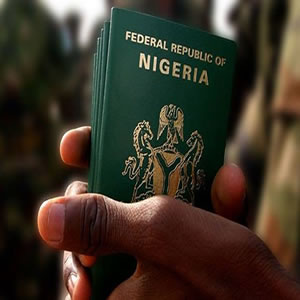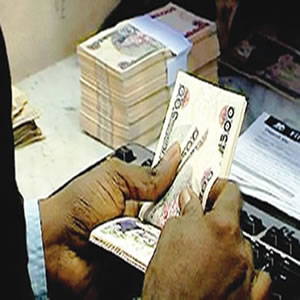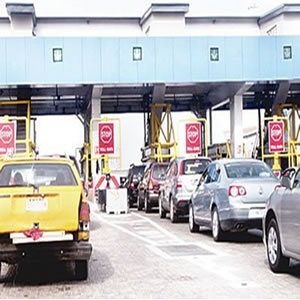NOT long ago, the Senate overwhelmingly supported the reintroduction of toll gates on the country’s federal roads, describing it as the solution to the dilapidated road networks. It also agreed that the reintroduction would assist in revenue-generation drive of government and provide some sort of safety for road users.
The Senate’s resolution followed a motion sponsored by Suleiman Nazif (APC/Bauchi North). After deliberations, the upper chamber mandated its Committee on Works to liaise with Infrastructure Concession Regulatory Commission (ICRC) and other relevant stakeholders to develop policy and technology to facilitate the construction, maintenance and tolling of major roads in the country.
Months earlier during a press briefing, Minister of Power, Works and Housing, Babatunde Fashola, gave hint to the plan and described it as “eminent commonsense.” He said that it would not be too much if the government asked every road user to pay a little to augment government funding for road maintenance.
According to him, “maintenance would be our watchword. We are setting up a robust maintenance regime to keep our highways in good shape. This shows that tolling is necessary to support government funding.”
The minister stated further that. We will use technology; so if you don’t pay cash, you will pay by token or ticket and the money is accountable and it will go to the right place. We will manage that fund properly and we will hold those who we put there to account.”
Former president, Chief Olusegun Obasanjo, had scrapped the toll gates during his administration, accusing them of having outlived their usefulness. Back then, he said that N63 million, which the toll gates generated daily, was nothing to write home about, apart from the fact that the gates constituted inconvenience to motorists and encouraged corruption.
The former president, however, assured that proceeds from the petroleum tax of N1.50k per litre would be used to improve federal roads in the country. Despite the assurance, little or nothing was known about how the tax was utilised to improve Nigerian roads.
During the last administration, part of the proceeds from Subsidy Reinvestment and Empowerment Program (SURE – P) was channelled towards funding federal road projects. It came under special intervention scheme and specific roads were targeted to be rehabilitated using the fund. Even at that, most of the federal roads remained in their horrible condition. Those not captured under the SURE – P intervention programme are, today, a shadow of themselves and real death traps.
The Manager, Ifesinachi Transport Company Ltd, Utako, Abuja, Mr Theophilus Abugu, told Sunday Tribune that the planned reintroduction of tolling is another attempt by the Federal Government to extort from the poor masses. He noted that even though the toll managers would collect from the drivers, commercial transport owners would add the cost into the passengers’ fare.
Abugu envisages a situation where traffic gridlocks would be the order of the day on the nation’s highways where those toll plazas are reintroduced. He said there was no doubt that the current and administration is fighting corruption and if capable hands were engaged, the revenue generated could support the efforts to maintain the roads, but he insisted that the money would still coming from poor Nigerians.
“In my view, toll gates will cause serious hold-ups, especially during seasons and put a lot of Nigerians in pains while travelling. Going by what the roads are now, a small pothole, causes hold-up that will delay vehicles for up to 30 minutes and not talk of when there is obstruction-collecting money and issuing receipts along the road.
“We have been maintaining the roads without toll gates, so the issue of how the money generated is going to be managed is dependent on the people who are going to be there.
The current administration is fighting corruption and as such, if capable hands are there, the money could be put into judicious use. The issue is that the money is still coming from the masses that are crying of hard economic situation now and the hold-up should not be pushed aside,” he stated.
The Public Relations Officer of Peace Mass Transit Company Ltd, Abuja, Mr Jude Ngwu, said he was not against the proposed reintroduction of toll gates provided the funds are used to fix roads across the country.
Ngwu, said reintroducing tolling would be asking motorists to pay double taxation. According to him, when Obasanjo removed the toll gates, he had built it into fuel price.
He said: “We pay toll fees whenever we buy fuel because since then, but we have not had any substantial evidence showing that the money removed from fuel, to eventually return back to toll gates.
“On the second part, reintroduction of tolling is not the problem but the problem of financial management. How will the proceeds be managed. If these proceeds are directly used to repair our roads, I don’t think anybody will have any reason to resist its reintroduction.
“Inasmuch as we may not be happy that they are introducing, we can pay double if they can keep the roads in good condition,” he said.
Similar, views were expressed by other Nigerians. Boniface Thomas, a Civil Servant, told Sunday Tribune that reintroduction of tolling was capable of generating employment for the youth in the country, but how the monies generated from toll gates are used would be the major concern.
Omeiza Ajayi, who spoke with said the country does not need tolling of its highways now. He warned that the same way government made nonsense of SURE-P is the same way it will bastardise the tolling of highways. According to him, the way to get out of the present economic recession is not to increase different forms of taxes or levies, but to introduce a stimulus package to cushion the effect of the recession.
“Tolling is a good policy, but not in Nigeria.
“Tolling is a way of financing road infrastructure usually through a Public-Private Sector-Partnership (PPP) arrangement. Elsewhere, roads are tolled, but the roads are always in good shape. “Nigeria cannot toll roads that are in bad shape. If any road must be tolled, then such road must have all the necessary facilities that modern roads where roads are tolled.
“We must remember that former President Olusegun Obasanjo removed the toll-gates because he said they had become gates of corruption. According to him, while the N65 million made daily from the gates could not be accounted for, roads leading to the toll gates were often associated with gory potholes.
“So, how were they making N65 million daily, yet even roads that were less than a kilometre away from the gates were in a bad shape? he querried.
Felix Khanoba, cautioned that reintroducing toll gates should not be a priority of the government at the moment.
He argued that government should first ensure that all major roads in the country that now look more like death-traps be put in good shape.
“Subjecting people to road tolls will not only increase the hardship of the masses, but will further erode the thin confidence in government as the provider of public good,” he said.
“Besides, the payment of road tolls in the past didn’t yield the desired result of good roads and that may likely repeat itself.
“Government should soft-pedal on the issue and explore other possible ways to ensure that roads are properly maintained. Money being realised from oil subsidy removal can be channelled into road maintenance through agency like FERMA,” he said.
Also speaking with Sunday Tribune, Gboyega Onadiran, argued that the timing of the reintroduction is wrong as the move will place a huge burden on the masses who are already overburdened by the current recession.
He recalled that some workers and other retired staff in states are being owed salaries, pension and gratuities, while Nigerians are saddled with the burden of buying petrol at N145 per liter, as well as the increase in prices of goods and services.
“I feel that it will be wrong and unfair for the government to return the toll gates. I believe government should take the lead by fixing some of the dilapidated roads and building new ones before reintroducing the toll gates.
“I suggest that government should explore the public private partnership model to deliver efficient and durable road networks that will facilitate movement of goods and services, as well as boost the economy at little or no cost to it, rather than taxing the people more.
“Government must also ensure that it has blocked all the possible loopholes were funds could be syphon and diverted into private pockets before reintroducing the toll gates
“I urge the Minister of Power, Works and Housing, to initiate the same PPP model he used to develop Lekki-Epe Road in Lagos when he governed the state.”
Source:Tribune







